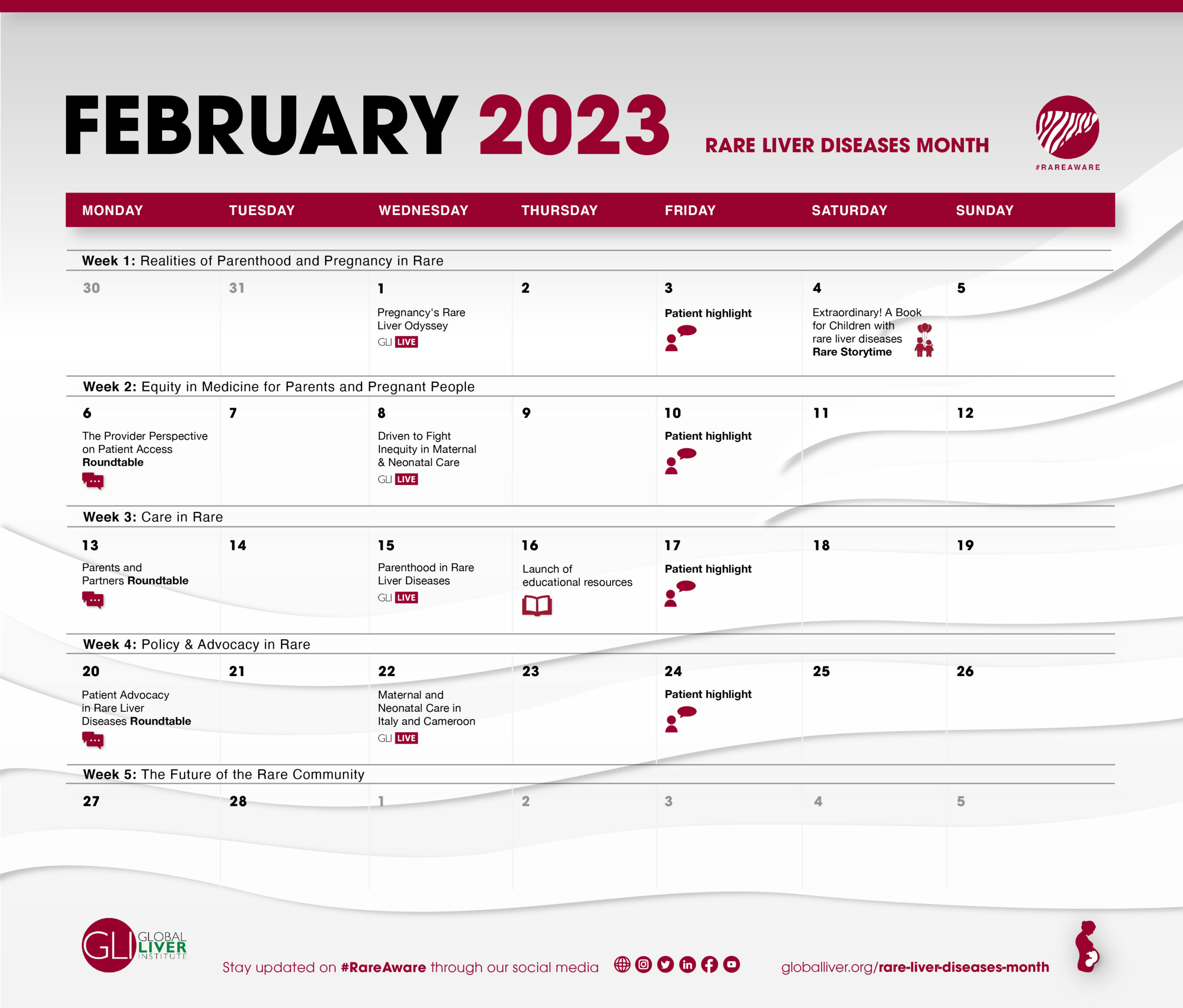Obstetric and Neonatal Professionals Must Work More Closely with Pregnant People to Identify Liver Diseases Early
Global Liver Institute Draws Attention to Rare Liver Diseases & Pregnancy during Third Annual #RareAware Campaign
(Washington D.C., February 1, 2023) – Global Liver Institute (GLI) launches its third annual #RareAware campaign today to raise awareness of and build resources for liver health challenges to maternal and neonatal well-being through a series of webinars, storytimes, and social media outreach. Liver diseases such as intrahepatic cholestasis of pregnancy (ICP) and biliary atresia (BA) can complicate a pregnancy or endanger a newborn’s earliest days, in the worst cases threatening the lives of baby and mother alike.
“Most pregnant women and families of young children were never informed that liver health is an essential aspect of a healthy pregnancy and birth. This omission can prove deadly, unnecessarily so,” shared Donna R. Cryer, JD, President and CEO of GLI. “To protect the lives of these parents and their children, we call for enhanced primary care systems to promote timely diagnosis and comprehensive care for pregnant people and their babies.”
Though maternal and neonatal rare liver diseases are mainly unheard of and rarely discussed, across the world they affect thousands of lives:
- Hemolysis, Elevated Liver enzymes and Low Platelets (HELLP) syndrome, a severe form of preeclampsia, threatens both mother and baby’s life in over 1 in 1000 pregnancies.
- Existing nonalcoholic fatty liver disease (NAFLD) has been tied to intrahepatic cholestasis of pregnancy (ICP), an issue with the flow of bile in the liver, which affects 1 in 300 pregnancies.
- Acute fatty liver of pregnancy can develop postpartum, which although extremely rare, can be highly fatal.
- Many rare liver diseases begin to affect newborns in the first few years of life, causing life-threatening symptoms if they are not treated quickly.
- Jaundice (yellow skin or eyes due to excess bilirubin), common in infants, can be either a benign symptom of a developing liver or indicative of severe disease.
For any liver disease during pregnancy or early in life, early diagnosis is critical to access the complex, robust care required to mitigate issues. A misdiagnosis or late diagnosis, often due to appearance of symptoms late in a pregnancy, can heighten risk.
If liver diseases are ignored during pregnancy, it can lead to serious health complications for both the mother and the baby. The mother may experience liver failure, bleeding, and infection. The baby may be born prematurely or with low birth weight, and may also be at risk for liver problems, while maternal mortality risk increases. Even liver disease unrelated to but during pregnancy, such as an infection with viral hepatitis, can cause complications. Clearly for many patients, a liver treatment plan is a vital part of a healthy pregnancy.
Thus, we must collectively remove the barriers to comprehensive prenatal care that many people face – whether living in a geographic maternal care desert, limited access to care due to insufficient insurance coverage, delayed diagnosis, or the heavy financial load that treatment for rare disease can amass. Since these barriers are most prominent for already disadvantaged communities, it is both a matter of equity and a matter of life and death. A proactive, attentive prenatal and neonatal care team can help bridge that gap.
The month of February is full of opportunities to learn more and share about this troubling relationship between liver disease and maternal/neonatal health:
- Download our social media toolkit and share our graphics with your followers.
- Learn about the different rare liver diseases through our “Be #RareAware” posts
- Watch weekly episodes of GLI LIVE each Wednesday at 12PM ET on Facebook, LinkedIn, and YouTube.
- Register to attend the roundtable series, investigating key perspectives in pregnancy and liver disease.
Join a book discussion with Kara & Evren Ayik, co-authors of Extraordinary!, to help families with rare liver disease understand their condition and connect with peers.

Join the conversation online with the hashtag #RareAware!
“Anyone, no matter who they are or where they live, deserves the best possible care during pregnancy and childbirth –that includes discussions of liver health,” Royze Cachero, manager of Pediatric and Rare Liver Diseases at GLI, said.
Please join us!
For questions about the campaign or if you or your organization are interested in getting even more involved, please reach out to pedsrare@globalliver.org. For media inquiries, please reach out to communications@globalliver.org.
About Global Liver Institute
Global Liver Institute (GLI) is a 501(c)3 nonprofit organization founded in the belief that liver health must take its place on the global public health agenda commensurate with the prevalence and impact of liver illness. GLI promotes innovation, encourages collaboration, and supports the scaling of optimal approaches to help eradicate liver diseases. Operating globally, GLI is committed to solving the problems that matter to liver patients and equipping advocates to improve the lives of individuals and families impacted by liver disease. Follow GLI on Twitter, Facebook, Instagram, LinkedIn, and YouTube.

